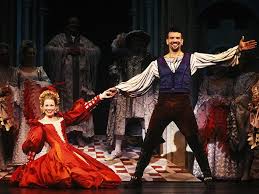 RACISTS DON'T DO THEATRE by Thomas Putnam Racists don't do theatre. It's simply too much for them. Is this a politically incorrect thing to say? Actually I don't care much if it is politically incorrect, but I am concerned if it is morally wrong. It's just that I am ready to have auditions for our Spring production of Molly Metzler's THE MAY QUEEN and for once it would be a dream to have a fully racially-mixed cast. This is Black History Month, and we are celebrating MLK's vision/mission this Sunday (after being re-scheduled from January 15.) MLK had a dream, and I don't think that mine is too far off from his, certainly smaller in scope but actually a demonstration of that dream. There are only five people in this cast: two men and three women. Any of these characters could be played by any race. Of course, that could be said of any play, but this one which takes place in an insurance office could very well be filled with people of any and all races. We've never had this in an HG production. One might argue that this is not surprising since Tioga County is hugely populated by white residents. But certainly not everyone in Tioga County (or within driving distance for rehearsals and performances) is white. We rarely have people who are not white auditioning for roles in plays. Why is that? We have had people drive from Elmira and Corning and near Williamsport and nearly to Bath and Coudersport and Troy. I want to make sure that Hamilton-Gibson Productions is a place where people of all races feel welcomed and safe. Theatre tells some powerful stories and some of those stories are ones that racists just might not tolerate. Theatre has the potential to transform, to change, to enlighten, to convict, to broaden. A racist can't handle that kind of change. The auditions are February 23 at 6:30; February 25 at 6;30 and February 27 at 1:00 all at the Deane Center, upstairs, Main Street in Wellsboro. Later on Feburary 27 we host a choral celebration on the last Sunday of Black History Month of the life and vision of MLK at the Wellsboro High School. We welcome all races to audition for this play, The May Queen. I have a dream that this cast will be multi-racial. Spread the good news.
0 Comments
 BRUSH UP YOUR SHAKESPEARE by Thomas Putnam Do you know the song from the musical KISS ME KATE called “Brush Up Your Shakespeare”? It's a fun song that incorporates a whole lot of titles from the Bard's list of 36 (or 37...or 38...or...) plays. The musical, itself includes a play within a play, in this case Shakespeare's THE TAMING OF THE SHREW. It's a clever weaving of the basic SHREW story as the characters in the musical almost parallel the characters in SHREW. I've been thinking a lot about Shakespeare lately for a number of reasons. First, HG is opening a version of THE TAMING OF THE SHREW on March 3. (Don't miss the opening night reception following the performance on Thursday!) It's the story through and through re-told in “modern” English. If you've had trouble in the past with iambic pentameter, try this production out. Though we miss the poetry, we get all the humor and plot situation that has intrigued audiences for over 400 years. It's in the Coolidge with re-configured seating...and you get to see real-life couple Natalie and Titus Himmelberger duking it out. I'm also thinking about Shakespeare because the following play is the comedy INTO THE BREECHES which tells the story of a community theatre that decides to produce Shakespeare's HENRY IV and HENRY V without any males to play the roles! They are all off fighting in WWII. The play by George Brant wonderfully weaves in much of the glorious language of these two plays as the cast of women rehearse for the Henriad. We're in rehearsals for this one which opens April 1. And I'm thinking about Shakespeare because our summer theatre arts camp for kids is SHAKIN' UP SHAKESPEARE. We'll be jumping into all sorts of things Shakespeare...and we'll be singing “Brush Up Your Shakespeare”!  Shakespeare is funny. Clare made that comment in rehearsal recently in an appreciative response. In rehearsing for Shrew, we find ourselves laughing, much of the time. While I greatly appreciate the original language of most of Shakespeare’s writing, this show uses a modernization of the script. While some of the music of the words may be lost, the meaning is much more accessible, as is the humor. The actors are finding innumerable ways to accentuate the implicit tenderness, belligerence, and funny bone tickling that the bard bestowed upon us. Clare and Linda have been working on this show for years, and now that they chose to include us in the process, they are deftly guiding us to find ways to both enhance the presentation as well as overcome our tendency to play to the audience downstage. This is theater in the round, and we have to learn to move (a lot) and to to be expressive with our bodies and the backs of our heads as well as our faces and voices. Cheating takes on a whole different meaning (the theatrical kind people …. ok … there’s a little bawdy humor too, but … ), and audiences can truly have a different experience every time they come – especially if they don’t sit in the same seats. I love the period in a production when people are starting to get comfortable with their characters and lines because then the hidden interactions are discovered. Things are tried, and experiences evolve, and the best stuff gets kept for the performances. Given what I’ve seen so far, Shrew will pull at a lot of emotional strings – including the funny bone. That’s because... Shakespeare is funny. 
 A little over three weeks from opening, the cast was getting ready to rehearse Act 5, Scene 2, described by director Clare Ritter as "the big hoo-haw conclusion." As I arrived, the cast was "coming and going," to the Deane upon arrival, then to the Warehouse for "head shots" with Bruce Dart, then back to the Deane for rehearsal in the Coolidge Theatre. Here and there actors tried on a costume piece. I asked Clare about the time period "historically" for costumes and all, and she said something like, "Well, the audience will certainly know that the costumes are not current dress." And I'll add, audiences familiar with Shakespeare will know that this tale is being retold. And all will relax and sit back and have an enriching good time. It's not the SHREW you saw in Stratford. It's this one. It has a cast of about 15, twice as many men as women [see earlier blog inquiring about where the men are—now we know where some of them are]. And it has some younger folk in the cast.. They arrived from HG high-school-age choir practice just as I was leaving. I know most of these people and have seen them in other shows, and it is always fun, and enriching and empowering, to see them do something quite different. And the Petruhcio/Katherine leads are played by real-life couple, Natalie and Titus. I saw Natalie to chat a bit as she was going home, and she spoke of Kate as witty and clever and her own person (which is how I saw her in this rehearsal, and wanted to confirm with the actress herself). Audiences will love this interaction I think, between this man and this woman, and will find it believable. As all were through running this scene a couple times, Clare made a few director comments including how the feeling of "reacting and interacting" among all was developing so well. And then to the practical advice (requirement) about what shoes to wear: quiet soles and low heels because the loud sound of footsteps carries so clearly in that theatre! One guy asked if his red shoes would be okay; I didn't hear the answer. Aside from the show itself, which promises to be delightful/engaging/inspiring, I came away feeling very happy about the relationships of the actors off stage. My experience is that HG people get along nicely, and that they often actually create new friendships. So, it's no surprise to me, but I just love what I saw when people were off-stage or leaving. I don't know how well they knew each other before SHREW, but I liked what I saw last night. I have felt that too. |
Archives
July 2024
|
|
Hamilton-Gibson Productions
Providing opportunities for people of all ages to enrich and empower their lives through community performing arts.
OFFICE
29 Water Street, Wellsboro, PA 16901 PHONE 570-724-2079 |

 RSS Feed
RSS Feed